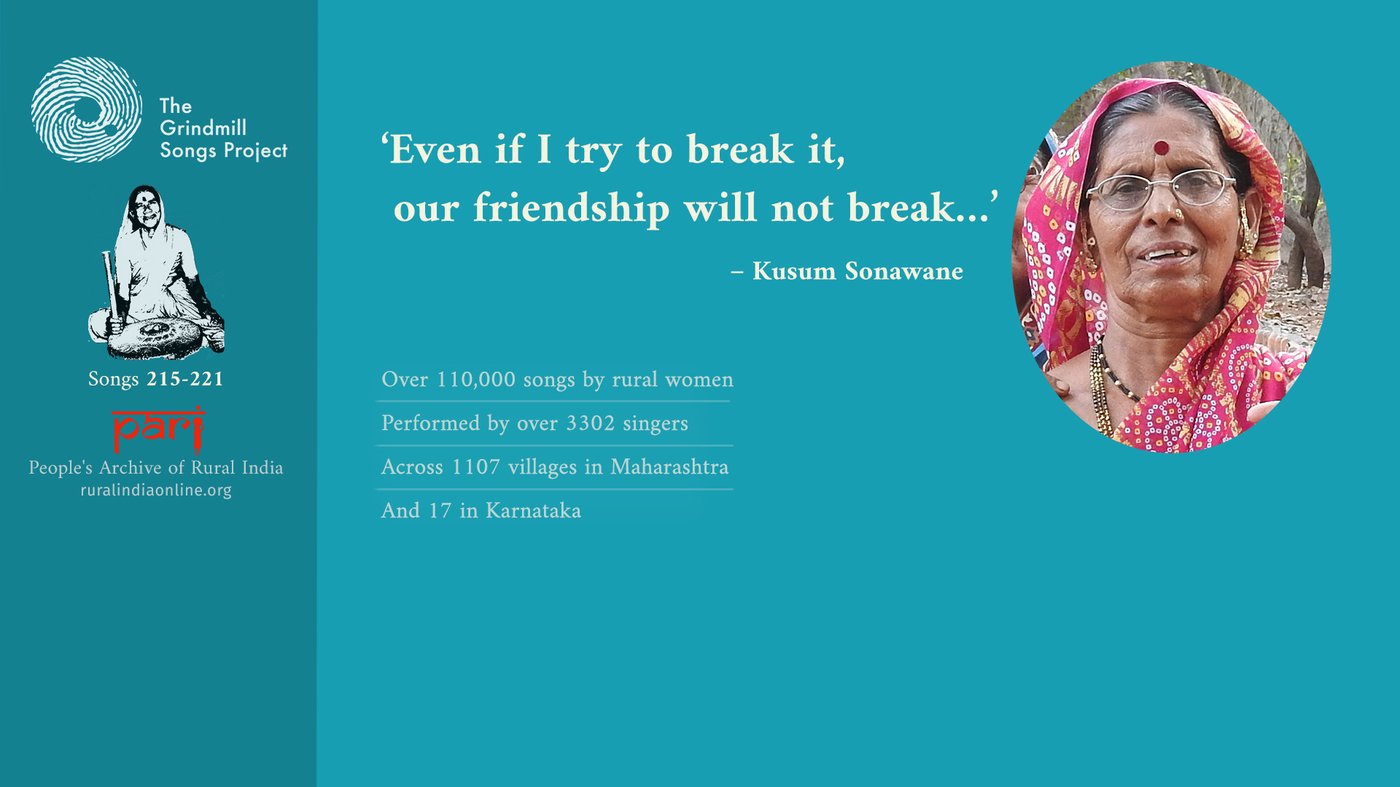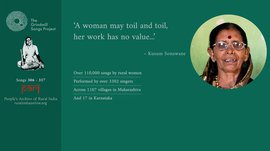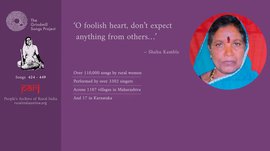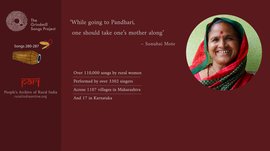The Grindmill Songs Project presents seven ovi by Kusum Sonawane and Shahu Kamble of Nandgaon village, which speak of the strong but sometimes fragile friendship among women
You and I, our friendship will not break
It is like a knot in a silk thread that cannot be untied
They were sisters-in-law, but their friendship was stronger than any bond forged by marriage could be.
“Our songs were very popular. People from other villages in Mulshi would invite us to sing Ambedkar ovi for his birth anniversary celebrations.” That’s Kusumbai Sonawane, 70, speaking about her friendship with sister grindmill singer Shahubai Kamble. The two would work together pounding grain with a pestle in a wooden container to remove the husk and, while at it, they would think up new tunes for grindmill songs. During the routine chore of making jowar or rice flour on the stone grindmill, they would sing and practise ovi set to these new tunes. That’s what we learned while visiting Kusumbai at her home in Nandgaon village in Pune district’s Mulshi taluka in September 2017.
During the late 1980s, when a team led by Guy Poitevin and Hema Rairkar visited villages across Maharashtra, singers like Kusumbai and Shahubai contributed ovi to the grindmill songs database. Some of these women also became members and activists of the Garib Dongri Sanghatana (GDS) – an organisation of the poor from hilly areas in Pune district. Guy Baba and Hematai, as members of this organisation still affectionately call them – both are no more – helped bring awareness through different GDS activities, including adult literacy classes.
On March 25, 2017, Hema Rairkar’s death anniversary, some GDS members had gathered at her bungalow in Pune to commemorate both their leaders. Among them were Mathabai Bhalesain and Bababai Laygude from Maval taluka , and Kusumbai Sonawane and Lilabai Kamble from Mulshi taluka. These four women, who are friends and co-workers say, “We are not formally educated but our experience [in the GDS] gives us the confidence to raise issues that affect us in the gram sabha [village meetings].” Often these are about the scarcity of water and the need for tankers.
They’re quite amused when we try to get them to smile on camera.
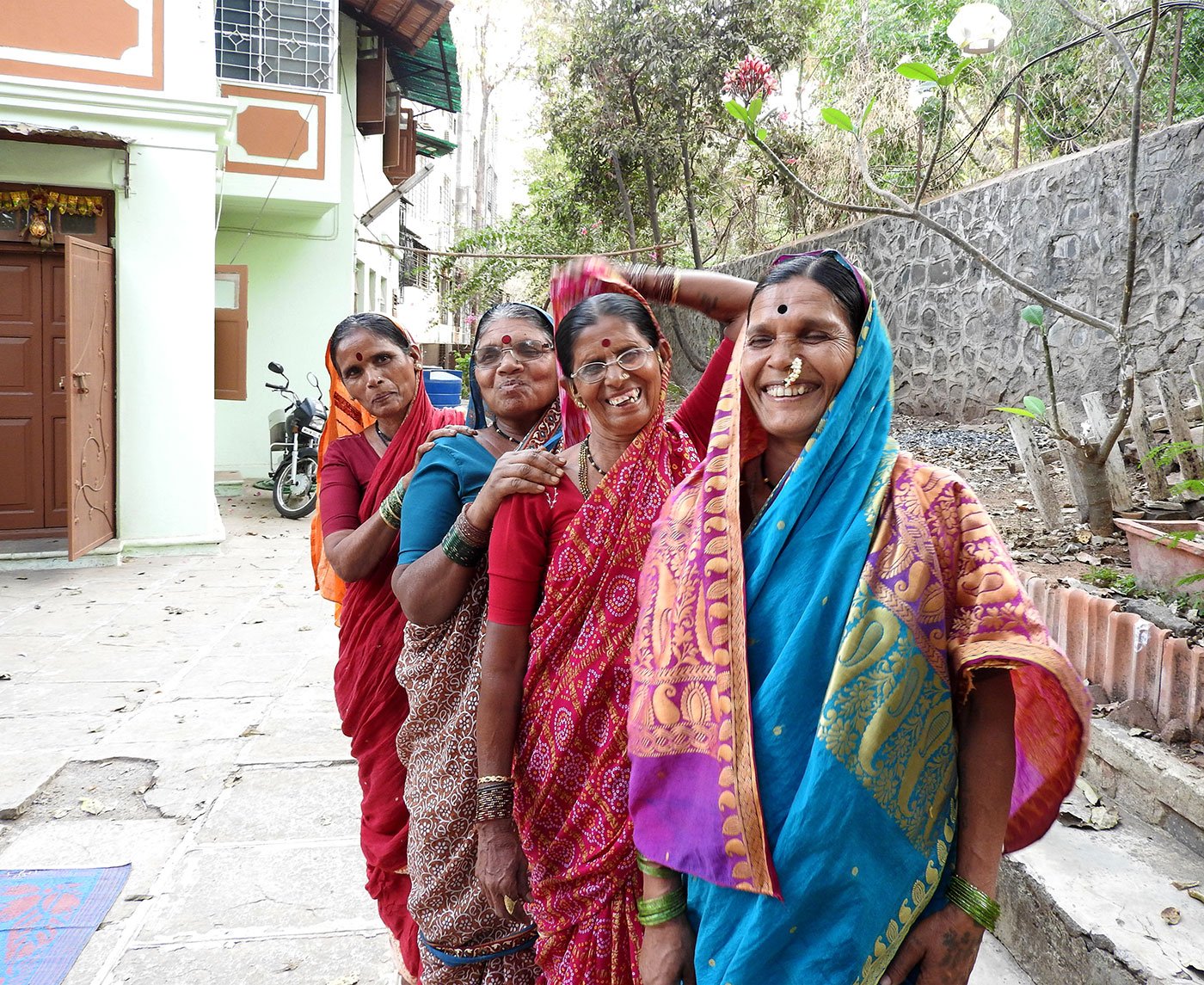
Left to right: Mathabai Bhalesain, Lilabai Kamble, Kusumbai Sonawane and Bababai Laygude in the courtyard of the Rairkar bungalow in Pune on March 25, 2017. They all laughed when asked to smile
PARI celebrates International Women’s Day, March 8, for up to a month after that date. And so this edition of the Grindmill Songs Project carries seven ovi about friendship among women. Shahubai and Kusumbai sing the first five together. The last two couplets are sung only by Shahubai. She even names her friend Kusumbai in one of these.
The Marathi term used for friendship in these songs is bhaupana , which literally means brotherhood or fraternity. The mixing of salt and caraway or fennel seeds is a metaphor for a misunderstanding between two friends, probably created by someone telling untrue tales about one to the other.
You and I, we are close friends, sing the two women. But, they ask, who mixed in the pungent caraway seeds? One friend says to the other, “Let me convince you to give up your silence and let us go back to the village.” In the next ovi, they sing, “Who mixed salt into our friendship?” One friend pleads with the other, “Taru, my friend, don’t be silent, speak to me.”
“What can I give our friendship, let us share a clove, Savitrabai, and eat it together,” says one singer indicating that nothing is too small to share between friends. And even if she tries, their friendship will not break, because it is like the tight knot of a silken thread that cannot easily be untied.
Further, someone has mixed in fennel seeds and just like the sharp bits of the herb can sometimes poke while being eaten, this mixing of fennel has created a rift. The silence between them has made one friend restless, and she walks to and fro.
In the last two ovi Shahubai says let our bond go on and be everlasting, “I tell my friend Kusumbai, let the world say what it will.” She tells her to visit her once at home as if to cement their friendship forever.
Listen to these songs of bonding:
तुझा माझा ग भाऊ ग पणा कुणी कालविला ओवा
अशी आता ना माझी ग बाई सोड अबोला जाऊ गावा
तुझा माझा ना भावू ग पणा कुणी कालवील मीठ
बाई सांगते तारु ग बाई सोड अबोला बोल नीट
तुझा ना माझा ग भावपणा भावपणाला ग काय देवू
बाई सांगते सावित्राबाई एक लवुंग दोघी ग खाऊ
तुझा माझा ग भावपणा मी तर तोडीते तो ग तुटना
अशी रेशमाचा ग दोरा गाठ पडली ना ग सुटना
तुझा माझा ना ग भावपणा कुणी कालविल्या शेपा
अशी आताना माझी ग बाई अबोल्यानी घाली खेपा
तुझा माझा ना ग भावपणा कसा चालला तसा चालु दे
अशी सांगते कुसूमबाई जग बोलत ते बोलू दे
तुझा माझा ना भाव ग पणा भाऊपणाचा तगदा
अशी सांगते माझ्या ग बाई याव तु ग वाड्याला अेकदा
tujhā mājhā ga bhāū ga paṇā kuṇī kālavalā ōvā
aśī ātā nā mājhī ga bāī sōḍa abōlā jāū gāvā
tujhā mājhā ga bhāvū ga paṇā kuṇī kālavīla mīṭha
bāī sāṅgatē tāru ga bāī sōḍa abōlā bōla nīṭa
tujhā nā mājhā ga bhāvapaṇā bhāvapaṇālā ga kāya dēvū
bāī sāṅgatē sāivatrābāī ēka lavuṅga dōghīta khāū
tujhā mājhā ga bhāvapaṇā mī tara tōḍītē tō ga tuṭanā
aśī rēśamācā dōrā gāṭha paḍalī nā ga suṭanā
tujhā mājhā nā ga bhāvapaṇā kuṇī kālavilyā śēpā
aśī ātānā mājhī ga bāī abōlyānī ghālītē khēpā
tujhā mājhā nā ga bhāvapaṇā jasā cālalā tasā cālu dē
aśī sāṅgatē kusūmabāī jaga bōlāta tē bōlū dē
tujhā mājhā nā bhāva ga paṇā bhāūpāṇācā tagadā
aśī sāṅgatē mājhyā ga bāī yāva tu ga vāḍyālā aēkadā
You and I, ours is a close friendship, but who mixed in the caraway seeds?
How shall I convince you woman, give up your silence, let’s go to our village
You and I, and our friendship, who mixed salt in it?
Taru, my friend, I tell you, don’t be silent, speak to me
You and I, we are close friends, what can I give our friendship?
I tell you, Savitrabai, let us share a clove between us and eat it
Even if I try to break it, our friendship will not break
It is like a knot in a silk thread that cannot be untied
You and I, we are close friends, but who mixed in the fennel seeds?
Now my friend, restless in silence, walks to and fro
Our close friendship, let it keep on going as it does
I tell my friend Kusumbai, let the world say what it will
You and I, and our close friendship, let me remind you of it
I tell you my friend, visit me once, come to my house
Note: The mixing of caraway seeds, salt or fennel seeds is a metaphor for someone creating a misunderstanding between two friends, probably by telling untrue tales about one to the other.
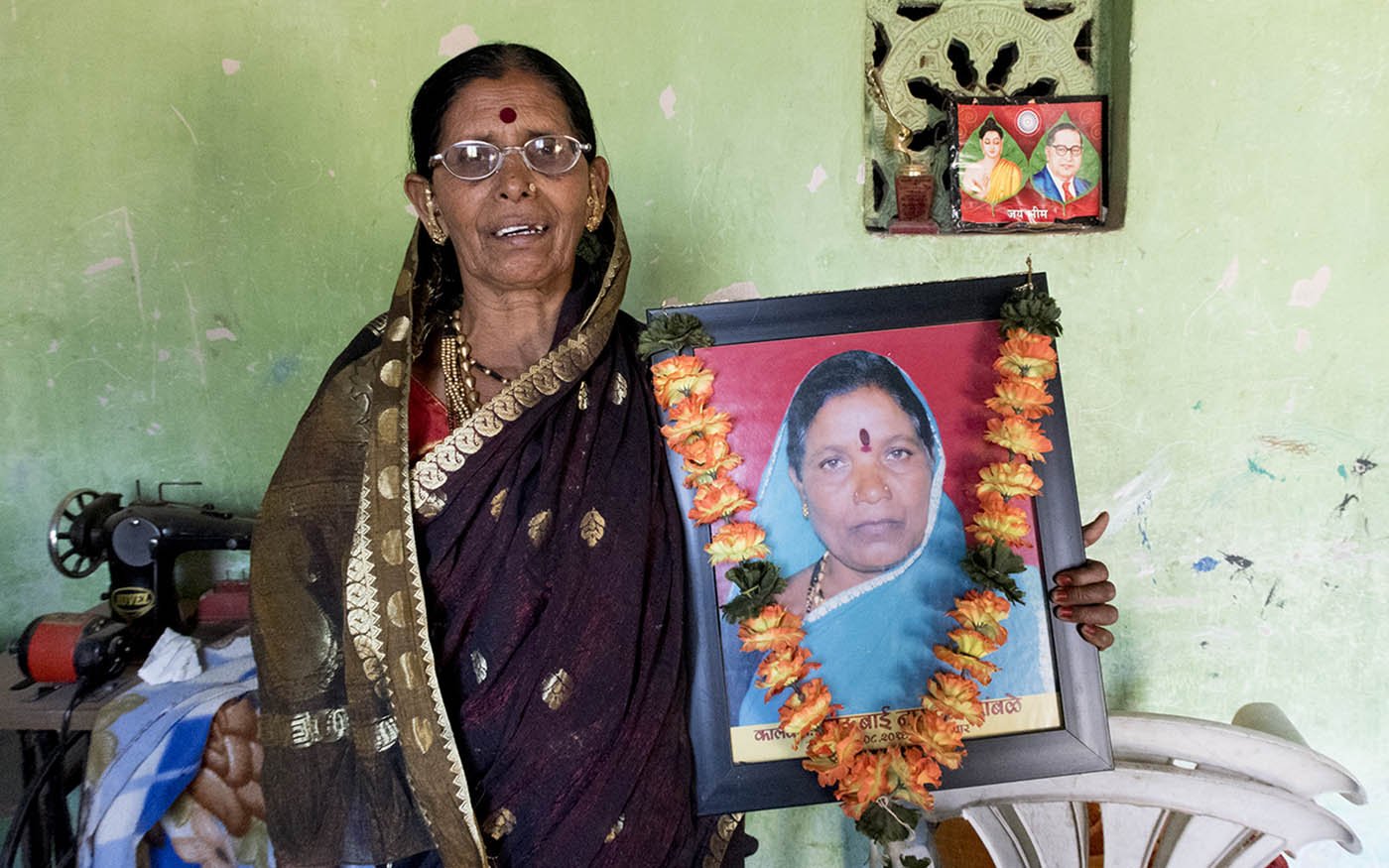
Kusum Sonawane with a photograph of Shahu Kamble, her sister-in-law and friend
Performer/Singer: Kusum Sonawane
Village: Nandgaon
Taluka: Mulshi
District: Pune
Caste: Nav Bauddha (Neo Buddhist)
Age: 70
Children: Two sons and two daughters
Occupation: Farmer
Performer/Singer: Shahu Kamble
Village: Nandgaon
Taluka: Mulshi
District: Pune
Caste: Nav Bauddha (Neo Buddhist)
Age: 70 (She died in August 2016 of uterine cancer.)
Children: Two sons and two daughters
Occupation: Farmer
Date: These songs were recorded on October 5, 1999. The photographs were taken on March 25, 2017 in Pune and on March 25, 2018 in Nandgaon.
Poster: Sinchita Maji
